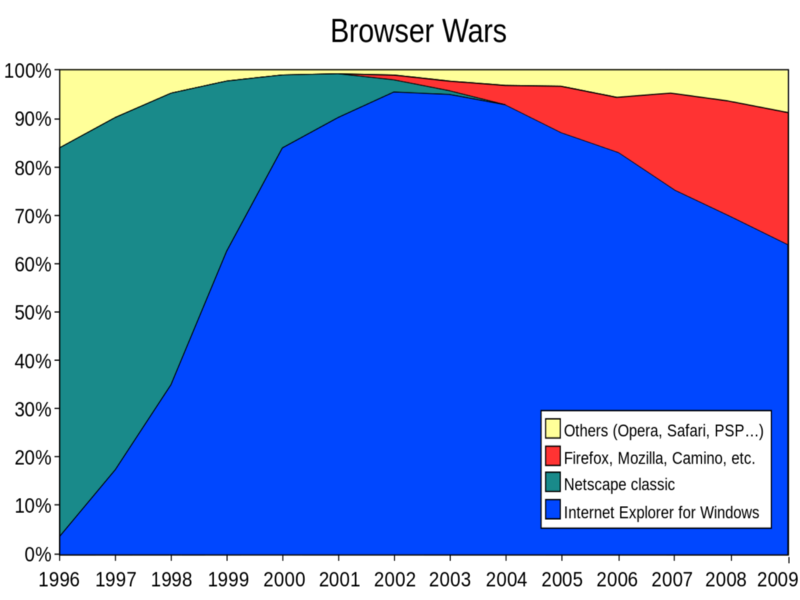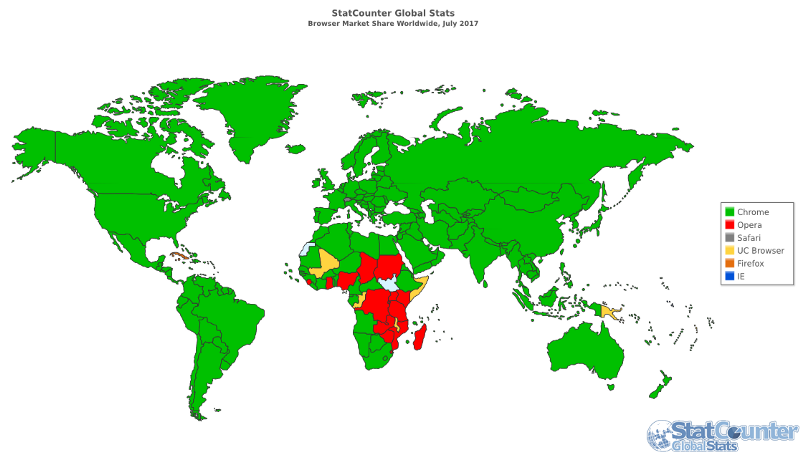We need a third browser war
In the late nineteens we had the first war in which Internet Explorer stood against Netscape’s Navigator, and between 2004 and 2017 we had the second war which basically ended up with google taking the entire market with Chrome.
The first war gave us JavaScript, very rapid innovation in web browsers and standards. Once that war was over Internet Explorer 6.0 was out, and we all know to what stagnation that led, with Microsoft having over 90% of market share. Between 2001 and 2006 there was only one update to Internet Explorer.

Market share of browsers, 1996–2009 Source: Wikimedia Commons
The second war brought us HTML 5, the rise of webkit and Chrome dominance. This is the state De-facto we are in now. Here is a map representing the most popular browser per country — color coded.

global stats counter July 2017. Source: Wikimedia Commons
At this point in time, it is clear Chrome, owned by google won the second browser war.
The Rise
When Chrome was released in 2008, it was clear it is being a success as within 3 months it gained 1% market share. After 3 years Chrome has passed Firefox as the second-most used browser. And it took only additional one year to surpass Internet Explorer and become the most used browser. Now we are talking about 70% market share, across all channels. Of course the rise of Android helped a lot, and the fact mobile as a whole took dominance of web browsing.
It was so obvious Chrome won, that Microsoft killed Internet Explorer in favor of Edge, which is basically a Chrome engine under the hood. Putting it bluntly: Google has become a Monopoly in the browser market similar to Microsoft’s dominance in the 90’s.
How did we get here
Firefox once was a viable alternative to Internet Explorer, and was much better in terms of features and performance. This was great, but the performance of Firefox declined over the years, making the choice for people to use Chrome, this is no longer an issue, since around Firefox 57, but it was somewhat too late and the harm was already done.
The other reason is much worse. Google used its mobile monopoly and forced preinstalled Chrome on mobile phones. On some phones you can’t remove Chrome, which led the European Union to fine google 4.3B Euro for antitrust violation.
The Ad economy
Google makes money from selling ads. In order to sell personalized ads google needs to know as much as possible about you. In order to know the most about you, google needs to track you as much as possible, and in order to present you the ad, it needs you not to block ads. In order to achieve that google blocked the ability to install ad blockers on Chrome on Android.
Another move google took is introducing AMP. With AMP the content comes from google, not the content creator, which gives google even more data about you.
In addition, google is pushing a standard called Signed HTTP exchanges. This standard will basically give google more power, as the amp cache is hosted on google, and will present the URL as the content source, while it is actually hosted on google’s servers. This standard is another nail in the coffin of privacy. Mozilla even went forward and marked this proposed standard as harmful. The only proposed standard in this category.
Back in January google proposed to change the api of webRequest that will break ad blockers — unless you’re a paying customer. This change led to an interesting discussion on ublock origin’s issue tracking system, the most popular ad blocker at the moment. This recent move made Mozilla (the company behind Firefox) build a new web site calling users to migrate to Firefox. I don’t think it will really help, but worth having anyway. In fact, the whole model of ad based Internet deserves a much lengthier post, but that is for another time.
Summary
What we face is again a tech giant using its power to move the market in the direction it wishes in order to gain revenue at the expense of its users. Recent developments of this story are concerning. Having one major browser dominate the web is bad for innovation, bad for user privacy and a threat to users freedom to choose.
What we really need is another browser war, that will lead to innovation, focus this time on privacy and performance and be user-centered. We deserve better, and we should demand better.